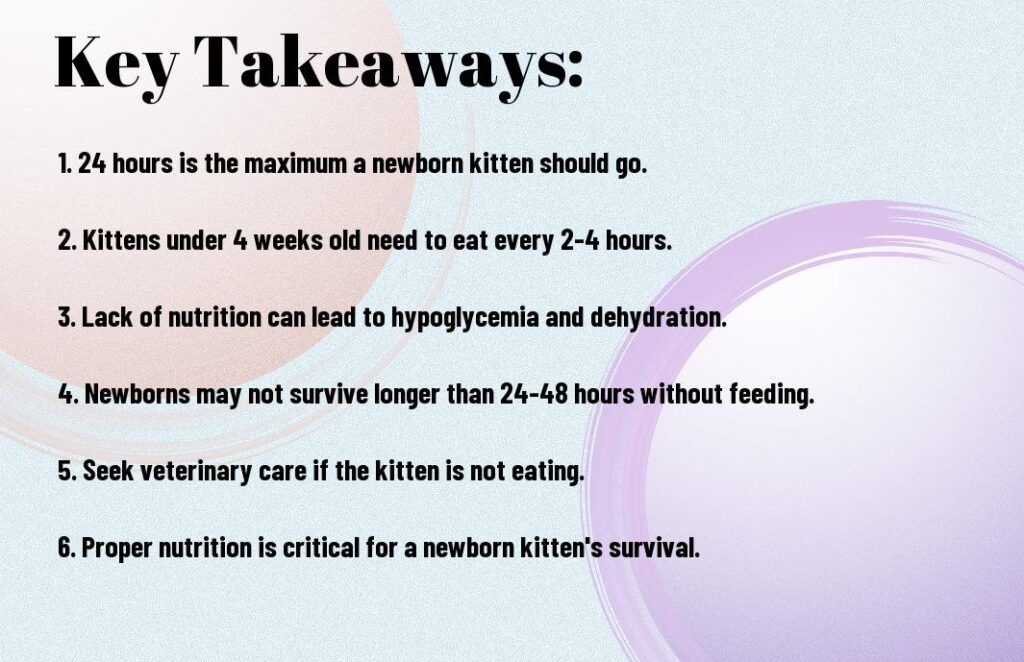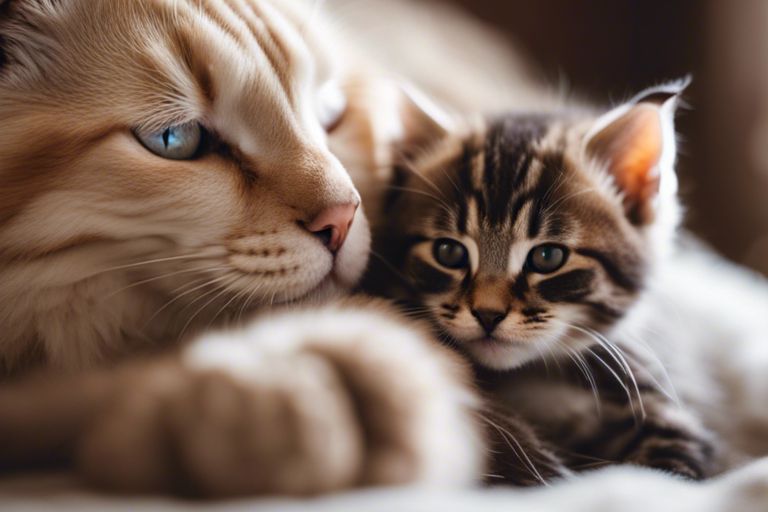You may find yourself in a situation where you need to care for a newborn kitten, and you’re wondering how long they can go without eating. It’s crucial to understand that newborn kittens are extremely vulnerable and require regular feeding to survive. A newborn kitten should ideally be fed every 2-4 hours, so it’s critical to ensure they are getting the nutrition they need. Without regular feedings, a newborn kitten can quickly become weak and dehydrated, which can be life-threatening. It’s important to monitor the kitten closely and seek veterinary advice if you have any concerns about its feeding schedule.

Understanding Newborn Kitten Biology
Any newborn kitten, like any other mammal, relies on its mother for nutrition in the initial stages of its life. At birth, a kitten’s digestive system is still immature, and they are not able to consume solid food. This means that their primary source of nourishment is their mother’s milk, which provides essential nutrients and immune support for their fragile bodies.
Caloric Needs and Development
During the first few weeks of their life, newborn kittens have high caloric needs to support their rapid growth and development. Their mother’s milk is specifically designed to meet these nutritional requirements, supplying the necessary protein, fat, and carbohydrates for healthy growth. Additionally, the mother’s milk also contains antibodies that help protect the kittens from infections.
Risk Factors for Neonatal Kitten Mortality
One of the biggest risk factors for neonatal kitten mortality is inadequate nutrition. If a kitten is unable to nurse or if there is a lack of maternal care, the chances of survival are greatly diminished. Other risk factors include hypothermia, infections, and birth defects. It’s important to monitor the newborn kittens closely and address any concerns with a veterinarian as soon as possible. Providing a warm, clean environment and ensuring that the kittens are nursing regularly will greatly improve their chances of survival.
- Inadequate nutrition
- Hypothermia
- Infections
- Birth defects
Though it’s normal for a small percentage of newborn kittens to not survive, ensuring that they receive adequate nutrition and care can greatly improve their chances of thriving.

Feeding Frequency and Guidelines
Some of the most critical care you will provide for your newborn kitten is feeding. Newborn kittens require regular, frequent feedings to ensure they receive the necessary nutrients for growth and development.
Ideal Feeding Intervals for Newborn Kittens
For the first few weeks of life, newborn kittens should be fed every 2-4 hours. This frequency mimics how often they would naturally nurse from their mother. As they grow, the frequency of feedings can be gradually reduced, but it is crucial to maintain regular feedings to ensure their development is on track.
Signs of Malnutrition and Dehydration
It is essential to monitor your newborn kitten for signs of malnutrition and dehydration. Some signs to look out for include lethargy, weight loss, sunken eyes, and dry, tacky gums. If you notice any of these signs, it is crucial to seek immediate veterinary care.
Potential Consequences of Inadequate Feeding
Keep in mind that inadequate feeding of newborn kittens can have serious consequences on their health and development. It’s important to understand the potential risks of neglecting their nutritional needs.
Short-term Health Implications
When a newborn kitten goes without eating for an extended period, there are immediate health concerns. Dehydration can set in quickly, leading to weakness, lethargy, and even organ failure. Hypoglycemia (low blood sugar) is another immediate risk, which can result in seizures, coma, and even death if not addressed promptly. Additionally, inadequate feeding can weaken the kitten’s immune system, making them more susceptible to infections and illnesses.
Long-term Developmental Concerns
Not receiving proper nutrition during the critical early stages of life can have long-term implications on a kitten’s development. Poor growth and underdevelopment are common outcomes, leading to various health issues as they mature. Cognitive and behavioral problems may also arise, affecting their ability to learn, socialize, and adapt to their environment properly. Furthermore, inadequate nutrition during this vital period can impact their overall life expectancy and quality of life.

Can a Newborn Kitten Refuse to Eat Due to a Headache?
It is not common to hear about cats experiencing headaches, but it is possible for a newborn kitten to refuse to eat due to a headache. If you notice unusual behavior, it’s best to seek advice from a veterinarian to ensure the kitten’s health and well-being.
Emergency Care and Intervention
Now, if you find yourself in a situation where a newborn kitten is not feeding, it is crucial to take immediate action to ensure their survival. If a kitten has not eaten for 12 hours or more, it is considered an emergency situation and intervention is necessary. Here are some steps you can take to provide emergency care for a newborn kitten.
When to Seek Veterinary Assistance
If you notice that a newborn kitten is not feeding, and it has been 12 hours or more since their last meal, it is time to seek veterinary assistance. Delaying medical intervention can lead to severe health complications and even death for the kitten. When you bring the kitten to the vet, they will be able to assess the situation and provide the necessary care and support.
Alternative Feeding Options and Supplements
If the mother cat is unable to feed the newborn kitten, or if the kitten is orphaned, you may need to consider alternative feeding options and supplements. You can use a kitten milk replacer to feed the kitten using a bottle or syringe. Additionally, you can consult with the vet to explore other feeding methods and supplements to ensure the kitten receives the necessary nutrients for their growth and development.
Remember, in emergency situations, it is important to act quickly and decisively to ensure the well-being of the newborn kitten. Seeking veterinary assistance and exploring alternative feeding options and supplements may be the difference between life and death for the kitten. Always prioritize the health and safety of the kitten, and do not hesitate to seek professional help when needed.
Conclusion
With this in mind, it is crucial to understand that newborn kittens should not go without eating for more than 4-6 hours. It is imperative to monitor their feeding schedule closely and provide them with appropriate nutrition to ensure their health and well-being. Remember that they are entirely reliant on their mother’s milk or a suitable kitten milk replacer for their nourishment, and any prolonged period without food can lead to serious health issues. If you notice any signs of distress or lack of appetite in a newborn kitten, it is essential to seek immediate veterinary advice to avoid any potential complications.
FAQ
How long can a newborn kitten go without eating?
Newborn kittens should ideally be fed every 2-3 hours. However, if necessary, they can go without eating for up to 4-6 hours at the most. It is important to monitor their weight and behavior closely during this time.
What are the signs that a newborn kitten is not eating enough?
Signs that a newborn kitten is not eating enough include lethargy, weight loss, excessive crying, and a decrease in body temperature. If you notice any of these signs, it is important to seek veterinary assistance immediately.
How can I help a newborn kitten who is not eating enough?
If you have concerns about a newborn kitten not eating enough, you can try stimulating their appetite by gently massaging their belly or offering a small amount of kitten milk replacer using a syringe. It is also important to keep them warm and comfortable and seek veterinary guidance as soon as possible.

Hello there, I am Iftekhar Ahmed. I am the owner of Mishka & The Cat Corners. I love to explore and write on various topics about cats

